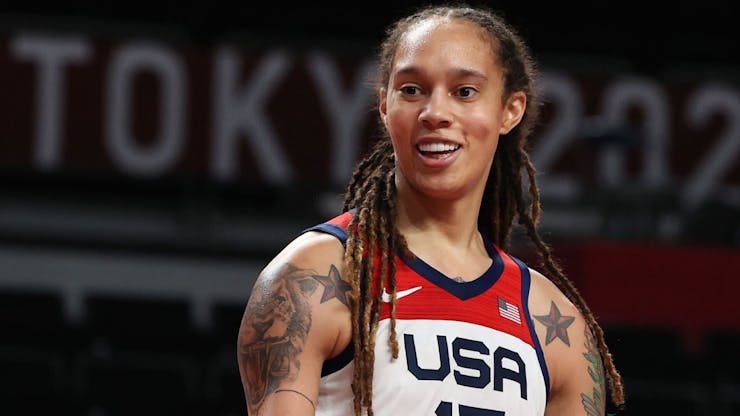Why are we only learning about this now?
Basketball star Brittney Griner, the WNBA champion and Olympic gold medalist, has been detained in Russia for days, if not weeks, after customs officials in Moscow allegedly found cannabis vape cartridges in her luggage.
The timeline of Griner’s arrest is unclear. Customs officials released security footage of a 6-foot-9 individual appearing to be Griner going through security at Moscow’s Sheremtyevo in February, but did not identify her by name or give an exact date of detainment.
Griner has a well-documented history of traveling to Russia for work in the WNBA’s offseason. Many WNBA players supplement their income by playing for overseas teams during the winter. In recent years Griner has played for Russia’s UMMC Ekaterinburg in the International Basketball Federation (FIBA)’s Women’s EuroLeague.
Her detention highlights not only the escalating tensions in Europe, but also the alarming trend of American athletes like Sha’Carri Richardson facing major international consequences for engaging with cannabis—even as cannabis legalization spreads across the United States, Canada, Mexico, and many other nations.
The Russian government has reportedly opened a criminal case against the seven-time WNBA All-Star due to national laws that prohibit the possession of recreational or medicinal cannabis. In Russia, the hashish vape cartridges that were allegedly found in Griner’s luggage could carry a 10-year sentence for just two grams.

What will happen to Brittney Griner?
The Phoenix Mercury, Griner’s WNBA team, issued a statement on Instagram Saturday, March 5, acknowledging Griner’s detainment. But the question that begs to be asked is obvious: How has this news remained quiet for so long?
Griner is one of the WNBA’s biggest stars. Headlines about Russia have dominated the global news for weeks. Sadly, Griner has been swept into a global chess match for trying to pursue her basketball dreams and earn a wage commensurate to her talent.
No WNBA player, let alone one of the league’s biggest stars, should have to work overtime overseas to supplement their salary at home. Perhaps if these women could receive wage parity in fair proportion to their male counterparts in the NBA, American treasures like Griner wouldn’t feel the need to travel to Russia at such a tenuous time in history.
Her vulnerability as an openly queer Black American trapped in a hostile Russian state should give any American alarm. She certainly faced anti-Black and anti-LGBTQ sentiments abroad and at home, long before Russia attacked Ukraine. But the dangerous circumstances of war and geopolitics further complicate an already stressful reality. That is, living in a world where a plant that does no harm can put a Black woman behind bars behind for simply trying to excel at her craft and career.





